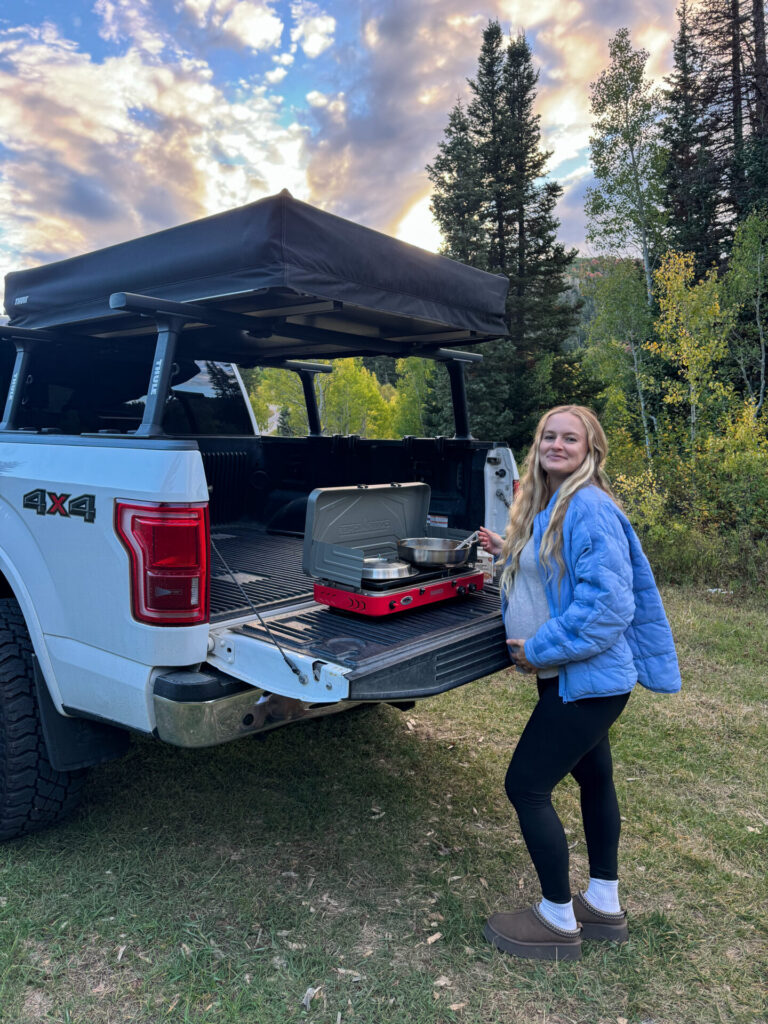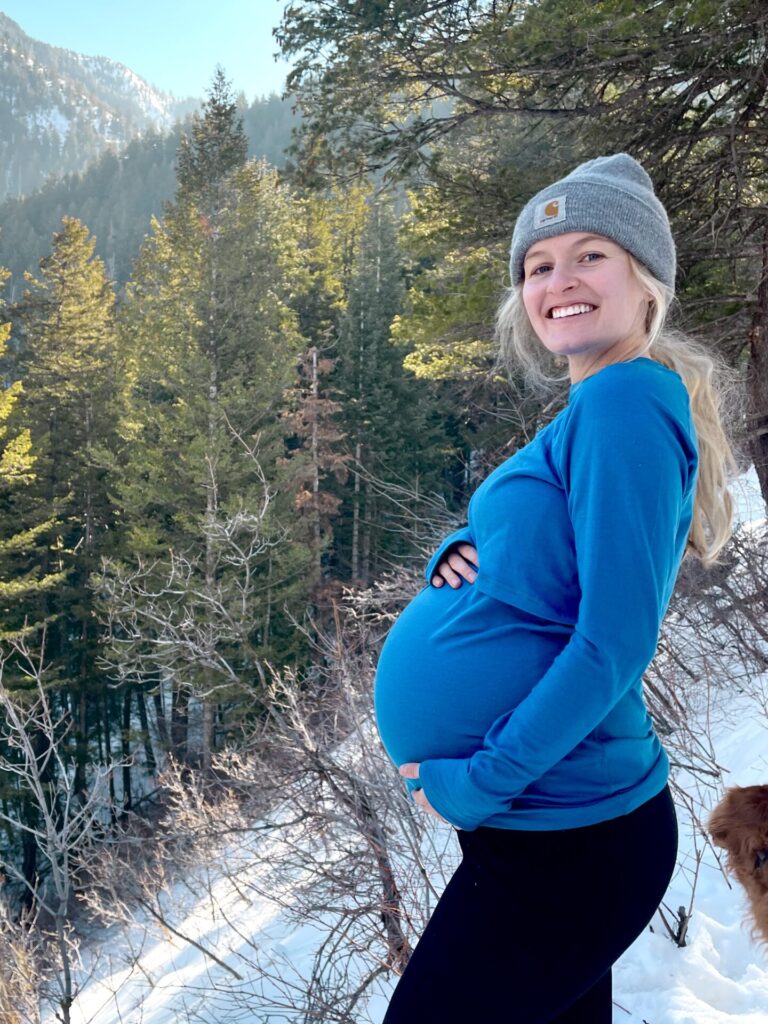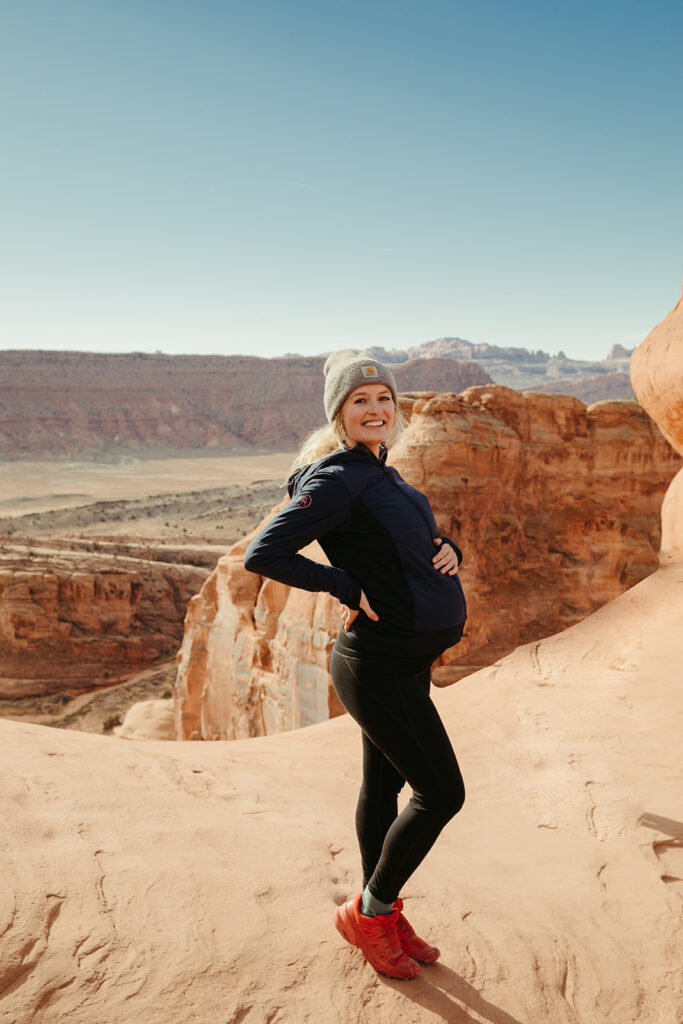
Pregnancy can be draining on the body, both physically and mentally. Finding ways to support yourself in both aspects can make a huge difference in your pregnancy. Remaining active during pregnancy has many benefits including improving mood, enhancing circulation, and preparing your body for labor. One amazing way to stay active is hiking, and when done with precautions, is safe for pregnancy!
I have hiked through two of pregnancies up into the day I gave birth and have found ways to do it safely and comfortably. I of course have discussed this thoroughly with my physicians and you should do the same before performing any exercises/outdoor activity while pregnant. Every pregnancy is different and your safety should be the number one priority.
*This post is not sponsored. Some of the links shared in this post may be affiliate links meaning I make a small commission off of your purchase (with no extra cost to you). This allows me to continue to create free content for my readers. Thank you for your continued support!
Consult Your Healthcare Provider
Before diving into the details of hiking while pregnant, it is important to remind you to always consult with your healthcare provider before starting an exercise routine, including hiking. While in general hiking is a safe activity to do while pregnant, individual health and pregnancy details may affect your ability to hike.
Preparing to Hike While pregnant
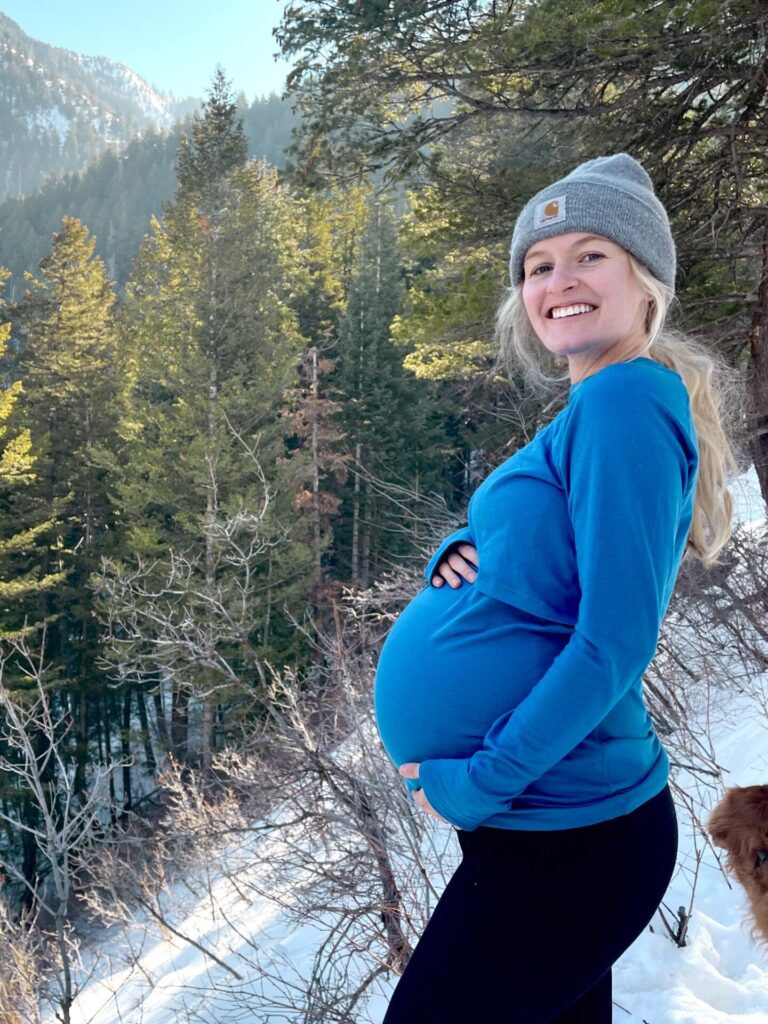
Choosing Suitable Hikes while Pregnant
One of the most important things to do while planning to hike pregnant is research! First, think about your fitness level and pregnancy stage. Doing a quick google search, or using an app like AllTrails, can show important details about a hike like terrain, elevation, and distance. While there is not a one-size-fits-all approach to hiking while pregnant, it is best to avoid potentially dangerous situations like slippery paths and rock formations.
Essential Gear and Clothing
Once you have your hike chosen, being prepared with equipment is equally as important. Having hiking boots or shoes that provide support is a good idea, as well as something to help with balance like hiking poles. Clothing can vary significantly depending on the weather, but wearing and packing layers is a good strategy to ensure you are comfortable throughout the hike. If you are further along in pregnancy, wearing a belly band can help support your hips and core and decrease lower back pain.
There are plenty of brands that make maternity athletic wear, and it really depends what time of year you are pregnant for what you are going to need. I was my biggest in the colder months so I opted to wear my husbands sweat pants and jacket and I bought a few merino wool layers in a larger size.
You can check out my Affiliate Amazon Store of Maternity Hiking Essentials Here
Hydration and Nutrition
Staying hydrated and maintaining a balanced diet while hiking pregnant is key to safety. Pack plenty of water and snacks, and always plan for longer than you expect! Some of my favorite snack ideas are crackers, fruit, pretzels, trail mix, granola bars, and cheese.
When packing, you do want to be mindful of the weight you will have to carry. Use cold water bottles to keep your food cold to prevent needing to pack extra ice. Packing extra water is important and worth the weight. As a general rule of thumb, pack about 1/2-1 liter for every 1-2 hours you plan on hiking. This is where researching the trail becomes extra important. Use the length of the trail and the average time it takes people to finish to plan snacks and water. Also take in the temperature into consideration. The hotter it is, the more water you will want to drink.
While you are pregnant and drinking more, you might find you have to go to the bathroom more often so have a plan for going to the bathroom on the trail! I liked choosing trails that I knew had a bathroom at the trailhead, and then I just brought a pee cloth with me if I needed to go off trail a little bit to go pee. A pee cloth just replaces your toilet paper (if you do bring toilet paper, please make sure to pack it out!) and can be as fancy as a Kula Cloth which is antimicrobial or can be as simple as a bandana.
Hiking with Others
While hiking alone can provide a nice escape and alone time, it is recommended to hike with others while pregnant, especially if you are newer to hiking. For safety reasons, being with at least one other person when hiking is beneficial, but you will want to make sure you choose a person who is comfortable with you setting the pace! Be upfront about what you might need from them, including help carrying equipment, physical support during challenging portions, and the understanding to stop whenever you need.
If you do decide to hike alone, make sure you let at least one person that you know and trust where you are going to be, any route variations you’re considering, and what time you should be back home. I also love hiking with my Garmin InReach Mini 2 if I am on a trail with no service. This allows me to send text via satellite and has an optional SOS button if I am in a dangerous situation.
Hiking with another child
A lot of moms are concerned about hiking with another child, especially a younger one who may need to be carried. In most cases, it is safe to carry your older child while pregnant, though depending on the size of your bump it could be a challenge. Back carrying is the safest, because it will impact your balance the least amount.
Many child carriers, including my two favorites the Ergobaby Omni Breeze and the Osprey Poco Plus, have a thick waistband, which may not be comfortable depending on how far along you are. As my bump got larger, I would wear the waist strap lower, under my belly. I did find my soft carrier to be more comfortable later on in my pregnancy. If you are hiking while wearing your older child, make sure to pack extra snacks and water and take more breaks! It is safe and possible, but definitely increases the challenge.
Pregnant On The Trail
Once you have prepared, it is time to hike! There are several things to keep in mind when hiking to keep you and your baby safe.
Safety Precautions

While hiking, make sure you stop for plenty of drinks. Remaining hydrated will keep you going for longer and help you maintain your balance in difficult parts of a trail. If you start to feel your mouth getting dry, stop and drink water. You want to avoid getting dehydrated, but if you notice yourself becoming dizzy, extremely fatigued, or confused, take a long break and slowly sip water until you feel better and then it is best to head back to the car. Being mindful about drinking throughout, and asking your hiking partners to remind you as well, can help avoid this scary situation. Planning to take a break to drink or eat every fifteen minutes or so can help as well!
I also like to pack electrolytes to help replace those minerals lost while sweating.
Hiking Techniques
Even the most avid hikers will have to change techniques while pregnant. The two biggest things to think about are posture and breathing. Hiking with a straight back and good posture helps circulation, which is important when pregnant to make sure your baby is getting enough nutrients and oxygen. In terms of breathing, a good way to monitor your activity level is by trying to talk. You should be able to hold a conversation while hiking to ensure that you are breathing at a rate that is safe for your baby. If at any point it feels challenging to talk or breathe, take a break until your heart rate has calmed down.
Managing Discomfort
There is a big difference between discomfort and pain, and it is up to you to know your limits. Listening to your body throughout pregnancy is key, especially when doing physical activities. Some common discomforts may include hip and back pain or swelling. Taking breaks, stretching, and elevating the swelling body parts can all help relieve this discomfort. If after a break you still are not feeling better, slowing down or stopping your hike might be your next best choice. While this can be frustrating, there is no shame in cutting a hike short! Be easy on yourself and remember you are growing a baby! Some movement is better than none.
If you are feeling sudden pains or anything that feels out of the ordinary to you, stop hiking, take a break, and head home. Consult with your physician about the pain as soon as possible.
After the Hike
Depending on the length and level of your hike, different levels of post-hike recovery may be needed. Continuing to focus on hydration and nutrition will help your body recover faster. In addition, make sure to stretch and rest before jumping in to your next hike!
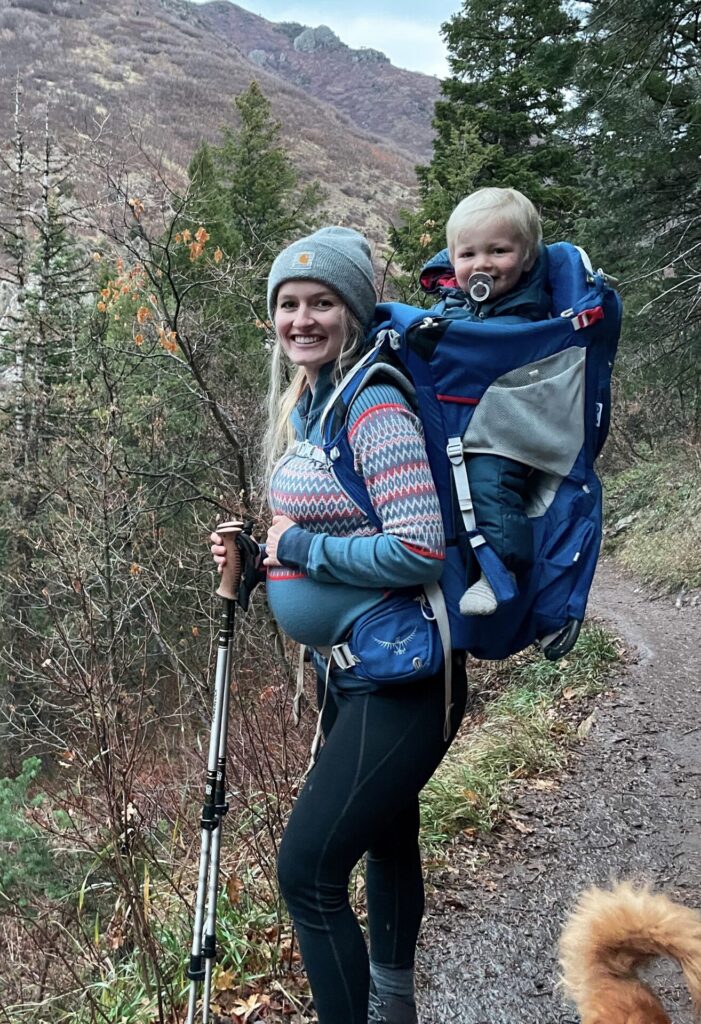
Frequently Asked Questions
Is it Safe to Hike While Pregnant?
In short, yes! Remaining active during pregnancy has many benefits including managing weight, improving mood, enhancing circulation, and preparing for labor. Of course, always consult with your healthcare provider before starting an exercise routine, including hiking. While in general hiking is a safe activity to do while pregnant, individual health and pregnancy details may affect your ability to hike.
When should I stop hiking during pregnancy?
You may not ever have to stop. If you start feeling pain, your pregnancy becomes high risk, or your physician tells you to, then you should take a break from all exercise according to your doctor’s recommendations and your own intuition. If hiking stops being enjoyable and you find other ways to stay active and healthy, then that is a great indication to take a break and hit the trails when you feel ready. Otherwise, keep on hiking! I hiked until the the day both of my kids were born. My pace slowed down and I did less miles but still loved every minute of it.
How long can a pregnant woman hike?
Pregnant women can hike as long as they feel comfortable. There is not exact mileage where it’s recommended pregnant women stop hiking once they hit a certain number. Everyone one is different and every woman can handle different length of trails differently. I would recommend not pushing yourself and making sure you give yourself plenty of time to turn around or finish a trail before completely exhausting yourself.
Chat with your physician about your comfort level and the miles you’ve been hiking and want to hike during your pregnancy so they’re aware of your activity level and give you are informed with your lifestyle.
How do you know if you’re overdoing it when pregnant?
A good way to monitor your activity level is by trying to talk. You should be able to hold a conversation while hiking to ensure that you are breathing at a rate that is safe for your baby. If at any point it feels challenging to talk or breathe, take a break until your heart rate has calmed down.
If you are feeling sudden pains or anything that feels out of the ordinary to you, stop hiking, take a break, and head home. Consult with your physician about the pain as soon as possible.
Can I carry my toddler on a hike while I’m pregnant?
Yes, if your doctor okay’s you for carrying the extra weight. I carried my toddler in my child carrier while pregnant with my second but made sure I always felt comfortable and was not exhausting myself. I still made sure I was breathing easily and could hold a conversation.
I wore my Osprey Poco Plus into my third trimester but eventually only wore my soft carrier, the Ergobaby Omni Breeze because I found it to be more comfortable. As my belly grew, I lengthened the torso length of the framed carrier so I could keep the waist band under my belly.
If this was a useful post for you, check out some of my other posts on motherhood on the trail:
- Hiking with Kids: 30 Ideas to Make Your Adventure Successful
- Essential Hiking Gear for Kids | What to Pack On a Hike with Toddlers
- What to Pack for Hiking with a Baby

